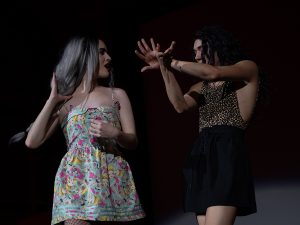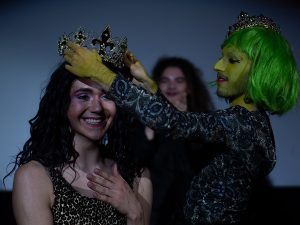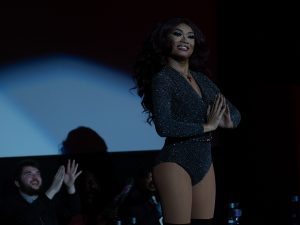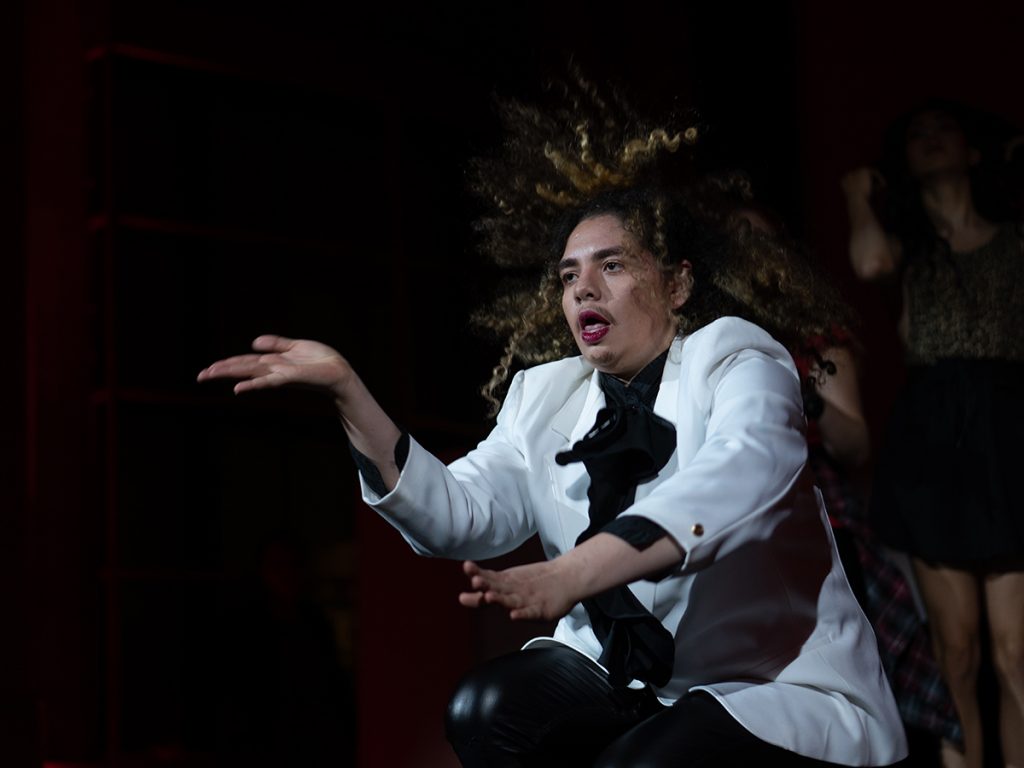EAGLE’s Haus of Emerson Immerses Students in Drag Culture, History
Left to right, Haus of Emerson contestants Anita Nappe (Anani Ramirez Barcelo ’19), Alexxxa Pro (Joey Sweeney ’20), and Phil Atio (Sarah Anderson-Krim 20) on stage. Photo/Declan Berkeley ’21
By Hannah Lacava, G’20
This year, EAGLE (Emerson’s Advancement Group for Love and Expression) held their 21st annual series of events for Queer History Month (October). The month culminated in Drag-Tober Fest, a weeklong dedication to the art of drag.
At the end of the week, students competed in the Haus of Emerson Ball, a drag competition put together in collaboration with EBONI (Emerson’s Black Organization with Natural Interests). EAGLE president Christopher Henderson-West ‘20 and celebrity drag queen Jujubee (RuPaul’s Drag Race Season 2 and RuPaul’s Drag Race Allstars Season 1) cohosted the competition.
Emerson College Today sat down with Henderson-West to discuss the month’s events and the role that EAGLE hopes to play in creating a more inclusive campus culture.
Q: The Haus of Emerson is based off of the New York Vogue Ballroom scene. What is a drag or vogue ball, and what does it entail?
A: It’s a comprehensive drag and dance competition. There are various categories, including Femme Queen Vogue, which is a vogueing competition; Dramatics, which is more full-out dancing, including spins and dips; and finally, Best Dressed, which is essentially a runway competition.

Q: Could you tell us a little bit more about the Haus of Emerson event? What made this year’s competition different from previous years?
A: So, in previous years, Haus of Emerson was just a lip-sync competition. This year, it was a whole process that involved workshops throughout the month. We had a workshop for vogueing, where we brought in London Escada, who has won various awards for his vogue performances. There was a photo shoot, where contestants took photos and shot a video that played during their runway walk on the day of the competition. There was also a makeup tutorial workshop with Mizery, a local drag queen who comes to Emerson pretty frequently. So it was a much more extensive process than years previous, which was essentially, “Come audition, the show’s in a month, tell us what song you’re going to lip-sync,” and that was about it.
Q: What inspired you to create a more extensive program for this year?
A: I always say that part of the reason I wanted to become EAGLE president in the first place was because I wanted to do Drag-Tober Fest. I really wanted to step away from what I felt was a watered-down version of drag culture. I wanted the contestants to learn about the history of drag, and how instrumental queens of color were in shaping this culture. I thought this was especially important because most of the people who participated were not people of color.
Simultaneously, I wanted contestants to feel like they were part of what is now a mainstream culture, thanks to staples like RuPaul’s Drag Race. I wanted it to feel like a high-stakes competition. I was lucky enough to have an executive board that was willing to listen and to go through all of the stress that was needed to make that happen.

Q: Where does the name “Haus of Emerson” come from?
A: The name is inspired by queens of color in the New York ballroom, vogue, and drag scene. Drag has been around for a long time, but in its early years, during the 1920’s and 1930’s, it was primarily a white gay thing to do. If queens of color tried to come in, and they weren’t white enough or white-passing enough, they weren’t allowed to compete.
So, by the ‘60s and ‘70s, the queens of color got together, and they formed families that they called houses. Essentially, they created spaces for people who had been cast out from mainstream society. Today, there are all types of houses dedicated to various things. We decided to call ours the Haus of Emerson, because it’s like the family of Emerson.
Q: What were some are your favorite events throughout the whole of Queer History Month?
A: There were 19 events total, so there is a lot to choose from. I really enjoyed an event called “Queerness and Witchcraft.” It was cool, because it’s an intersection that a lot of people don’t think about, but as it turns out, there’s a lot of queer history in the history of witches.
I also really enjoyed our screening of The Handmaiden, which was put on in collaboration with ASIA (Asian Students for Intercultural Awareness). It was followed by a discussion of international queer identities and the way kink has historically been represented in film.
Q: What do you hope events like Queer History Month and Drag-Tober Fest will add to the Emerson campus culture?
A: Essentially, we hope that we added to the number of safe spaces on campus, and that we left people feeling good and empowered about themselves and their community.
Because we collaborated with so many other student groups, I also hope we taught people outside of EAGLE more about queer culture. This component reflects part of our mission as an organization, which is to educate people.

Q: Last month, news broke about the Trump administration attempting to define gender solely by biological sex at birth, which was essentially considered by many as “erasing trans people out of existence.” What purpose do you think events like Drag-tober Fest serve at this particular moment in political history?
A: Well, that news actually came out on the day that we had already scheduled an event called “Empowerment of Trans Identities,” and I remember somebody saying “Well, this is a very timely discussion.”
To answer your question, I think it comes down to celebrating joy. It’s so easy to get caught up in the lows of today, and that takes a toll, mentally. I think having all these events to celebrate people’s identities gave people that chance to just be happy.
A few of the Haus contestants came up to me, and said “Thank you for doing this, because you opened up a part of myself that I may not have found.” And that’s the importance of celebrating people today, and letting them feel empowered by who they are. So that when more things hit the fan, they feel ready to rise up out of it.

Categories